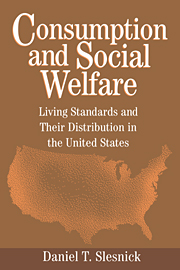Book contents
- Frontmatter
- Contents
- Acknowledgments
- 1 Introduction
- 2 The measurement of economic welfare
- 3 Measuring consumption: An initial look at the data
- 4 The cost of living
- 5 The standard of living
- 6 Does a rising tide raise all ships?
- 7 Consumption and poverty
- 8 Conclusions
- Appendix 1 Measuring individual and social welfare
- Appendix 2 Interpolating and extrapolating the expenditure distribution
- References
- Index
7 - Consumption and poverty
Published online by Cambridge University Press: 10 December 2009
- Frontmatter
- Contents
- Acknowledgments
- 1 Introduction
- 2 The measurement of economic welfare
- 3 Measuring consumption: An initial look at the data
- 4 The cost of living
- 5 The standard of living
- 6 Does a rising tide raise all ships?
- 7 Consumption and poverty
- 8 Conclusions
- Appendix 1 Measuring individual and social welfare
- Appendix 2 Interpolating and extrapolating the expenditure distribution
- References
- Index
Summary
The declaration of war on poverty by President Johnson marked the beginning of a comprehensive government initiative to reduce the incidence of poverty in the United States. New social programs were created and old programs were expanded in an effort to provide a safety net for those at the lower end of the income distribution. To monitor the success of this effort, a statistical program was implemented by the Bureau of the Census to provide annual estimates of poverty. The results have not been encouraging; although the proportion of the population living below the poverty line fell sharply between 1959 and 1973, little progress has been made since then. Inevitably, causal linkages between past public policies and the high poverty rate have been sought in an effort to solve the riddle of the persistence of poverty.
Many aspects of poverty and poverty measurement have been debated. Is the poverty line too high or too low? Is it appropriate to differentiate between male- and female-headed households in setting the poverty line? Which price index should be used to adjust the thresholds over time? Should in-kind transfers be included in measuring household resources and welfare? Although these issues and others have been discussed extensively, it seems to have escaped notice that the Census continues to measure poverty using income as an indicator of well-being. As with inequality, this practice undoubtedly distorts the poverty estimates.
Tabulations from the CEX indicate that consumption-based poverty rates are substantially lower than those tabulated using income.
- Type
- Chapter
- Information
- Consumption and Social WelfareLiving Standards and their Distribution in the United States, pp. 156 - 189Publisher: Cambridge University PressPrint publication year: 2000



